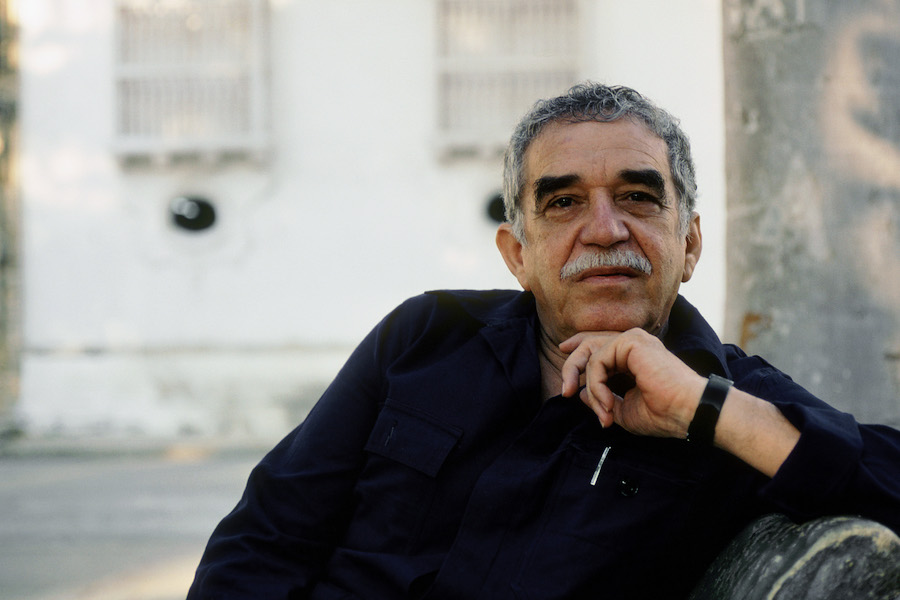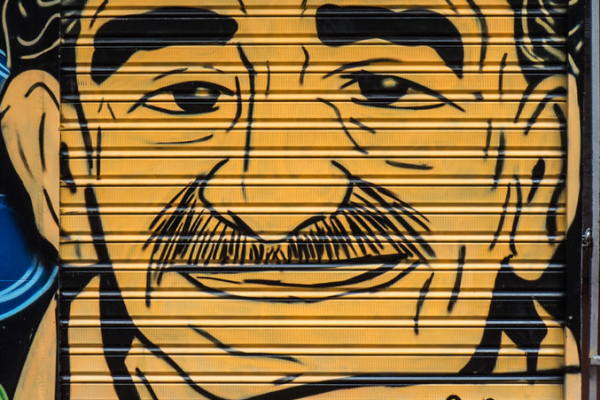Until August
Gabriel García Márquez, translated by Anne McLean
Knopf, $22 (cloth)
Gabriel García Márquez, the mago of Aracataca, and one of the planet’s finest writers, died in 2014. Hard to imagine in retrospect, but he did not always appear destined for the firmament; born poor and raised by his grandparents, he was a dedicated but struggling journalist whose first novella, Leaf Storm, languished seven years before finding a publisher. Another early book, The Evil Hour, came and went without fanfare. And then, in 1967, at the height of the counterculture, he published One Hundred Years of Solitude, a towering achievement that earned him critical adulation, a global readership, and ultimately a Nobel Prize.
Gabo, as he is affectionately known by his fans, had the kind of impact that only a handful of artists in any century, in any genre, have ever achieved. No one better dramatized First World realism’s inability to cope with Third World reality (or coloniality’s spectrality) than García Márquez. No one better strategized how those of us hailing from what is euphemistically called the Global South might capture our impossible realities, or meaningfully intervene in imperial struggle between the true and the real.
García Márquez changed art forever, full stop. And what he did for Latin American, for Caribbean writers, is perhaps only slightly less colossal: he opened an artistic door that no force on this planet has been able to shut. I am not alone in believing that I could not have become the writer I am without the spectrums that he brought forth.
Before dementia stopped his writing altogether, García Márquez had worked on and off on a final work of fiction that he never completed to his satisfaction. After five drafts an ailing García Márquez told his sons: “This book doesn’t work. It must be destroyed.”
He wasn’t talking out his neck. As anyone who has ever tried to track down early drafts of his work will surely know, García Márquez had a ruthless habit of destroying his drafts—never shy about exercising the writer’s ultimate prerogative to decide which of his work deserved to be given the light and which did not. His way, perhaps, of controlling his own literary myth.
By now you will have heard the drama: García Márquez’s sons ignored their father’s wishes and posthumously published the work that should have been destroyed as a “lost” novel—so lost an excerpt of which was published by the New Yorker in 1999.
Until August is about Ana Magdalena Bach, who every year visits the Caribbean island where her mother insisted on being buried, in order to clean the grave and bring her mother news of her world:
She had repeated this trip every August 16 at the same time, with the same taxi and the same florist, under the fiery sun of that destitute cemetery, to place a bouquet of fresh gladioli on her mother’s grave. After that moment she had nothing to do until nine the next morning, when the first ferry went back to the mainland.
Forty-six years old at the novel’s start, and “in a well-matched marriage with a man she loved and who loved her and whom she married before finishing her arts-and-letters degree, still a virgin and without any previous relationships,” Ana Magdalena Bach is the very definition of the mujer seria. She’s upper-class, educated, a reader of novels, a lover of music, an excellent dancer. She also happens to be a beautiful woman with “topaz eyes” and skin “the color and texture of molasses”—and she knows it. In other words, she’s something of a Macondo Maria Sue.
During the graveyard visit that opens the “novel,” Ana, for reasons that are hazily described at best, sleeps with a stranger, something she has never done before. He’s a “Hispanic gringo” who “revealed himself to be an exquisite lover who raised her unhurriedly to the boiling point.” The next morning she finds the lover gone, but he has left her a twenty-dollar bill, which infuriates and haunts her.
The following year Ana returns to the island, cleans the grave, chats briefly with her dead mother (whose reasons for being buried on this particular island she has never discerned), leaves another bouquet of gladioli, and then instead of reading the apocalyptic novel The Day of the Triffids as she had intended, tumbles into another one-night stand.
If you read it super generously or are a García Márquez stan, Until August won’t trouble you. The book is brief and there are occasional flashes of the wit that helped rewrite world literature—“She subjected him to the deadly technique of not taking him seriously”—and for some the simple pleasure of García Márquez’s voice, no matter how attenuated, might be enough.
Myself, I found the book trying—precisely because of its slightness. There just is not a lot there. Wisdom, doubt, complexity, human warmth, magic—all in short supply. People, too. Ana says about her different lovers “she knew him as if she always had” and “she knew him by then as if she had always lived with him.” If only the reader were so unlucky. The book’s characters are described but never deeply engaged with, never brought close. Ana suffers the most from this remote approach; we know she reads, we know she dances, we know she loves her husband, we know a bunch of stuff, but it’s all information, stays in the head, none of it passes into the heart or imagination, none of becomes real or true.
Ana Magdalena Bach is, in the end, not a spell but its components, awaiting an incantation that will never come.
And then there’s the writing, some of which gives the impression of having been composed by an AI—but an AI that has been starved of prompts. “At his first thrust she felt herself die from the pain and an atrocious shock as if she were a calf being carved up. She was left breathless, drenched in icy sweat, but she appealed to her primal instincts to not feel inferior or let herself feel less than him, and they threw themselves into the inconceivable pleasure of brute force subjugated by tenderness.” (The Spanish original, which leaves out the calf bit, still ain’t much better.)
For a book that invokes so much dancing and music it’s wild how little of either are on the page.
Until August is unsurprisingly a haunted book. Haunted by García Márquez’s death. Haunted by García Márquez’s words it must be destroyed. Haunted by his sons’ decision to publish the book against their father’s wishes. Haunted by García Márquez being forced to dance, one more time, against his will. Most readers won’t give a damn about the ghosts, dancing or otherwise, and that’s to be expected. Our obsession with ghost stories is the beard that hides how little we actually care about the wishes of the dead. Fans will leap at the chance to have once last dance with the maestro. In Aracataca they await the arrival of Gabo tourists like my campesino grandfather used to wait for rain.
But if García Márquez has taught us anything it is to pay attention to ghosts—whether they be José Arcadio Segundo, Prudencio Aguilar, Melquíades, three thousand dead banana plantation workers, or García Márquez himself.
Salman Rushdie, one of García Márquez’s deepest disciples, wrote in The Satanic Verses: “What’s a ghost? Unfinished business, is what.”
If the Until August affair teaches us anything, it is that whether we’re Gabriel García Márquez or Fulano de Tal, we are all unfinished business. Which is to say that neoliberal capital will never be finished with us; nothing will stop it from extracting labor from us—not life, not death.
Even in a book as forgettable as this, García Márquez is still offering us prophetic insights, but perhaps not precisely in the manner he anticipated or wished.
Boston Review is nonprofit and relies on reader funding. To support work like this, please donate here.








